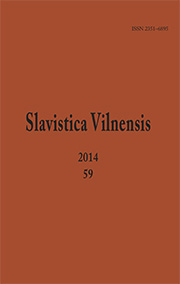Ворожю кусты одного древнерусского поучения, или Семантический вес запятой
Ворожю кусты from an Old Russian Homily or the Semantic Weight of a Comma
Author(s): Nikolaj P. AntropovSubject(s): Syntax, Semantics, Historical Linguistics, Russian Literature, Eastern Slavic Languages, Eastern Orthodoxy, Philology
Published by: Vilniaus Universiteto Leidykla
Keywords: Old Russian homilies against paganism; word combination ворожю кусты with and without a comma; its semantics; possibility of lexeme substitution кусты/ куксы;
Summary/Abstract: This paper analyses a fragment of an Old Russian homily from a Corpus of Homilies dating back to 1491. It comprises a word combination “ворожю кусты”, which Alexei Sobolevsky, the first researcher of the text, had separated by a comma, causing a misin terpretation of the fragment. It has been determined that the lexeme кусты found in the Galician-Volhynian Chronicle is unrelated to the one found in the homily. Therefore, this lexeme could be replacing what originally was куксы, appearing as a result of creative copying.
Journal: Slavistica Vilnensis
- Issue Year: 59/2014
- Issue No: -
- Page Range: 55-62
- Page Count: 8
- Language: Russian

